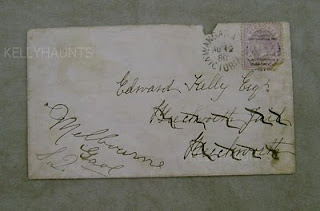In a letter forwarded to Capt. Standish (found at the PROV) from the Inspector's Office and then forwarded on to John Castieau (the governor of the Old Melbourne Gaol) there were warnings about the different ways that poison might be smuggled into the cell where Ned Kelly was imprisoned.
The letter starts out:
This afternoon a Gentleman whose name I could not ascertain but I believe belongs to the medical profession informed me that the greatest of care must be taken to protect "Kelly" charged with murder from obtaining poison.
He states during several years travelling on the Continent and other parts of the world he became thoroughly conversant with the use and disuse of poisons and that it can be delivered in a variety of ways without the least suspicion of discovery.
[He went on to discuss various ways that poison might be transferred to Ned..such as from a kiss, from food..and also]
"in having his linen impregnated"
"in soft paper saturated with poison and then dried"
"in the buttons of a coat or drawers where the outside cover can be taken off, the cavity filled up, and then recovered"
"the writing in a letter written with a solution of poison"
[there was more of the letter where he said he was sure every care was being taken by the authorities to prevent Ned getting poison... etc..]
Castieau's reply to Standish re the forwarded letter was thus:
"Returned with thanks to Captain Standish. The ingenious means of conveying poison that are spoken of were not unknown to me. Every care is being taken to prevent any accident happening to Kelly. I feel however convinced that as far as the prisoner is concerned he has at present no intention of doing violence to himself."
What is in the above letter about poison being possibly hidden inside buttons or linen impregnated with poison solution might explain this disturbing bit of information from J.J. Kenneally's "The Complete Inner History of the Kelly Gang" :
"Ned Kelly was still suffering from the effect of his wounds, but to such an extent had official callousness developed that his sister, Mrs. Skillion, was not permitted to see him. She had been informed that Ned was in need of a change of underclothing; and promptly purchased what was required, but the Beechworth Gaol authorities would not allow the clothes to be given to Ned Kelly. Mrs. Skillion then offered to go with one of the gaol officials and make similar purchases again, and suggested that the officials should take the clothes from the shop, and that she would not do so much as touch the articles purchased. Even this offer was refused, and Ned Kelly, on trial for his life and suffering from the effects of his wounds, was denied a change of underclothing by the gaol authorities."
"Mr David Gaunson, who defended Ned Kelly at his trial, was permitted to have an interview with him in the Beechworth Gaol, in the presence of gaol officials. In the interview Ned Kelly said: “I can depend my life on my sister, Mrs. Skillion. I have been kept here like a wild beast. If they were afraid to let anyone come near me, they might have kept at a distance and watched; but it seems to me to be unjust, when I am on trial for my life, to refuse to allow those I put confidence in to come with in cooee of me. Why, they won’t so much as let me have a change of clothes brought in!"
And what about him borrowing Gaunson's coat for court?
The parts about the possibility of saturated paper and letters being written in "poison pen" makes me wonder if Ned Kelly was ever allowed to read or handle any mail addressed to him at the gaol? Maybe if he was not allowed to handle it then perhaps a warder was allowed to read some of it to him?
 |
| Photo courtesy of Joe Dipisa (www.kellyhauntstours.com.au) |

No comments:
Post a Comment
All comments will be reviewed by the administrator before being published.